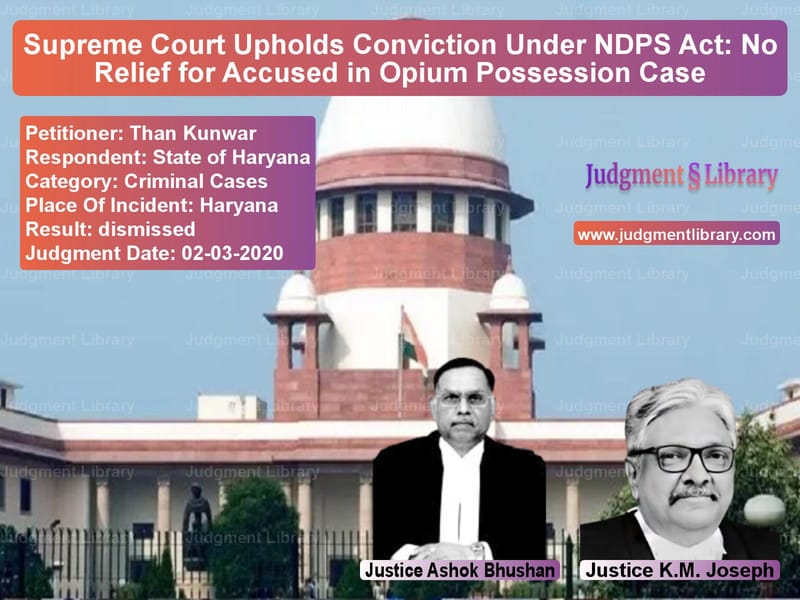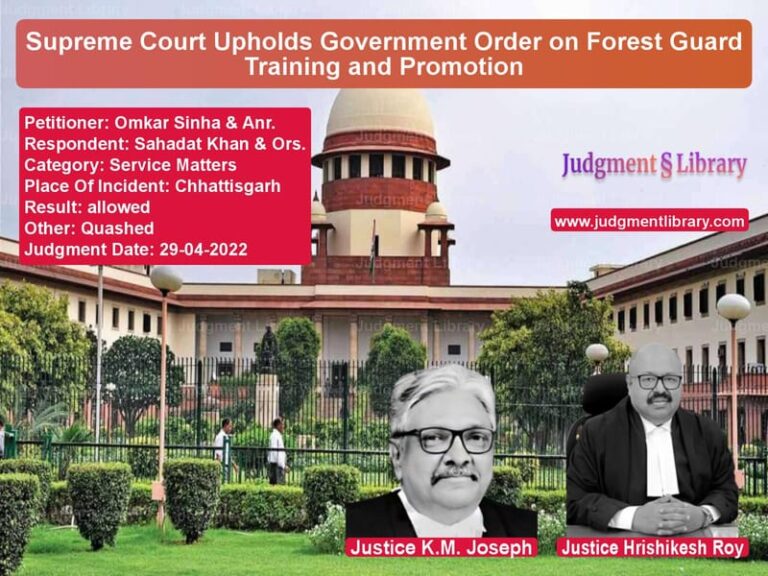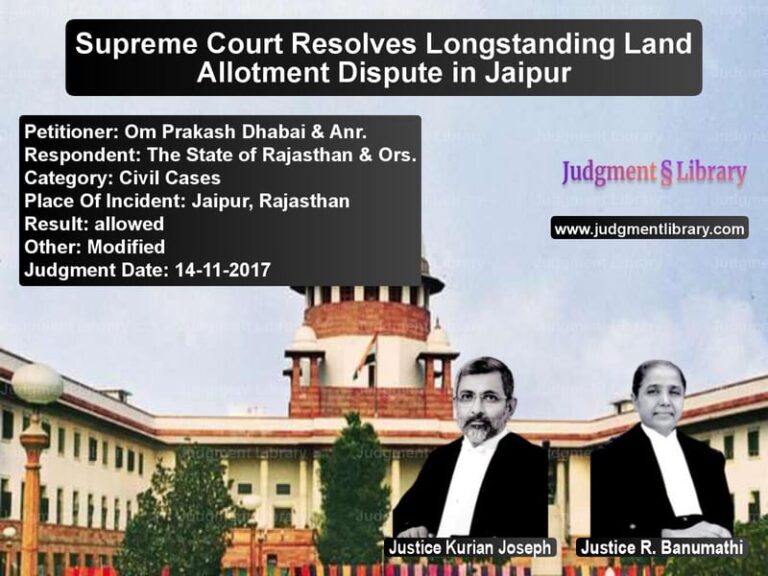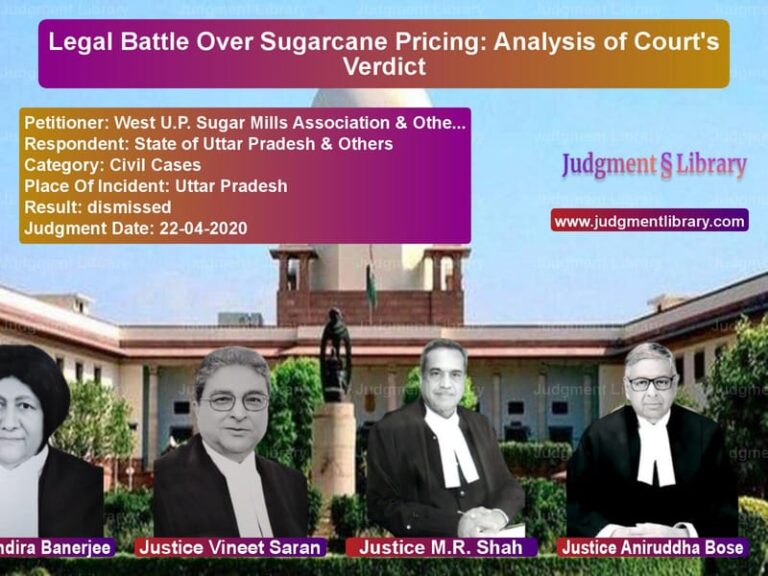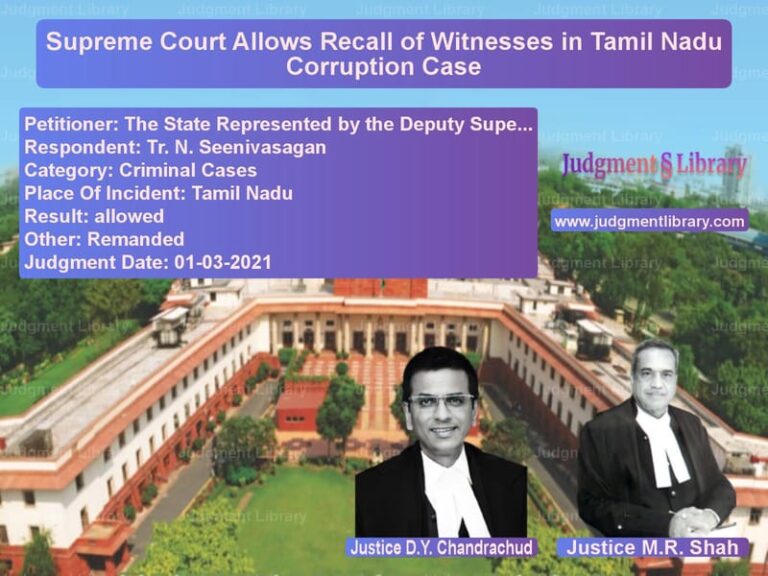Supreme Court Upholds Conviction Under NDPS Act: No Relief for Accused in Opium Possession Case
The Supreme Court of India, in the case of Than Kunwar v. State of Haryana, upheld the conviction of the appellant under Section 18 of the Narcotic Drugs and Psychotropic Substances Act, 1985 (NDPS Act). The judgment reaffirmed the principles of compliance with procedural safeguards and clarified legal standards regarding personal search and independent witnesses in NDPS cases.
Background of the Case
On April 10, 2004, ASI-PW7 and other police officials intercepted the appellant and another accused while they were walking briskly upon seeing the police near Marla Colony. The police suspected that they were carrying contraband and stopped them for a search. The appellant exercised her right to be searched in the presence of a Gazetted Officer. The DSP arrived at the spot, and the search led to the recovery of 6 kilograms and 300 grams of opium.
The samples were collected, and the appellant was arrested. After receiving the Forensic Science Laboratory (FSL) report, a chargesheet was filed against her under the NDPS Act. The trial court convicted her, and the High Court upheld the conviction. The appellant challenged the decision before the Supreme Court.
Petitioner’s Arguments
The appellant raised the following arguments to contest her conviction:
- “The presence of the Gazetted Officer was fabricated, as he was recorded to be present at another location at the same time.”
- “The seized contraband was never produced before the trial court, which vitiates the conviction.”
- “The mandatory requirements under Section 50 of the NDPS Act were violated, as her personal search was conducted without compliance.”
- “The prosecution failed to associate independent witnesses, despite them being available at the scene.”
Respondent’s Arguments
The State of Haryana, defending the conviction, countered with the following arguments:
- “The prosecution followed due process, and the Gazetted Officer’s presence was adequately proven.”
- “There is no legal requirement to produce the entire seized contraband in court, as long as the samples are properly preserved and tested.”
- “Since the contraband was recovered from a bag and not the person of the accused, Section 50 of the NDPS Act was not applicable.”
- “Attempts were made to include independent witnesses, but they were unwilling to participate.”
Supreme Court’s Observations
The Supreme Court examined the evidence, procedural compliance, and legal precedents before making the following observations:
“Judicial scrutiny of compliance with procedural safeguards is necessary, but minor discrepancies should not vitiate conviction where overwhelming evidence is available.”
On the issue of the Gazetted Officer’s presence, the Court noted:
“The appellant’s contention that the Gazetted Officer was present at another location is not sufficiently proven to discredit the entire case. Minor inconsistencies in witness testimonies do not render the prosecution’s case unreliable.”
Regarding the non-production of the entire contraband in court, the Court clarified:
“As long as the samples are intact and there is no tampering, non-production of the entire contraband does not vitiate conviction.”
On the applicability of Section 50, the Court held:
“Since the contraband was recovered from a bag and not from the appellant’s body, compliance with Section 50 was not mandatory.”
Final Judgment
The Supreme Court dismissed the appeal and upheld the conviction, ruling that the prosecution had followed due process, and the minor inconsistencies in the evidence did not warrant acquittal. The Court left it open for the appellant to seek a transfer to a jail in Madhya Pradesh for easier access to family visits.
Key Takeaways
- The ruling reinforces the principle that minor procedural lapses do not automatically invalidate NDPS convictions.
- Section 50 safeguards are not required if the contraband is found in a bag rather than on the person of the accused.
- Non-production of the entire contraband in court does not vitiate conviction if the chain of custody is maintained.
- Judicial scrutiny of procedural safeguards must be balanced against the need to prevent drug-related offenses.
Conclusion
The Supreme Court’s decision sets an important precedent for NDPS cases, particularly regarding procedural safeguards and evidentiary requirements. By upholding the conviction, the Court reaffirmed the need for strict enforcement of drug laws while ensuring fairness in procedural compliance. The ruling provides clarity on key aspects such as the role of Gazetted Officers, independent witnesses, and the admissibility of evidence in narcotics cases.
Petitioner Name: Than Kunwar.Respondent Name: State of Haryana.Judgment By: Justice Ashok Bhushan, Justice K.M. Joseph.Place Of Incident: Haryana.Judgment Date: 02-03-2020.
Don’t miss out on the full details! Download the complete judgment in PDF format below and gain valuable insights instantly!
Download Judgment: Than Kunwar vs State of Haryana Supreme Court of India Judgment Dated 02-03-2020.pdf
Direct Downlaod Judgment: Direct downlaod this Judgment
See all petitions in Drug Possession Cases
See all petitions in Bail and Anticipatory Bail
See all petitions in Judgment by Ashok Bhushan
See all petitions in Judgment by K.M. Joseph
See all petitions in dismissed
See all petitions in supreme court of India judgments March 2020
See all petitions in 2020 judgments
See all posts in Criminal Cases Category
See all allowed petitions in Criminal Cases Category
See all Dismissed petitions in Criminal Cases Category
See all partially allowed petitions in Criminal Cases Category

